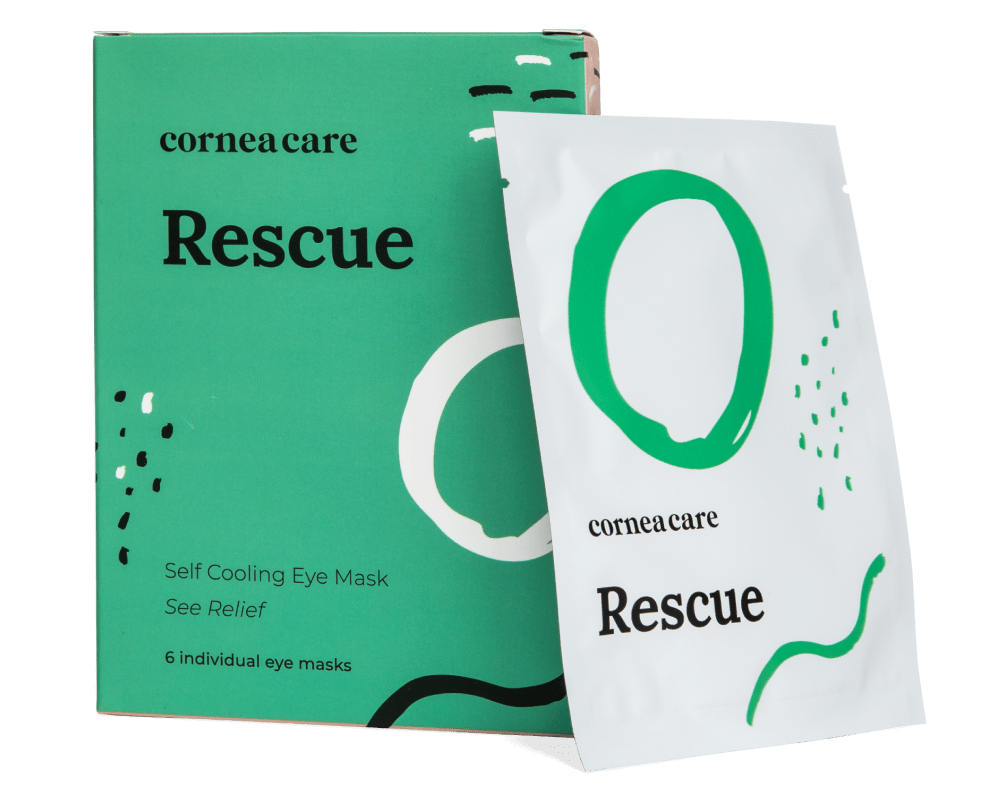What Are Headaches and Eye Twitching?
Have you ever experienced an annoying twitch in your eye or an intense pounding in your head? These sensations can be discomforting and interfere with daily activities. Especially when headaches and eye twitching occur together!
Headaches are characterized by pain in any region of the head, ranging from mild discomfort to severe throbbing. They can occur on one or both sides of the head and may present as sharp, throbbing, or dull aches.1
Eye twitching, also known as myokymia, involves involuntary spasms or contractions of the eyelid muscles. While eyelid twitches are usually harmless and temporary, they can sometimes indicate more significant health issues.2
Most headaches and instances of eye twitching are benign and not a reason to worry. You can feel better with just a few lifestyle changes that help!
However, it’s important to recognize when these symptoms might signal something more serious, prompting a visit to a healthcare professional.
Key Points
- Understanding the underlying causes of headaches and eye twitching is important for effective management and prevention.
- Lifestyle factors such as stress, fatigue, and dehydration, along with medical conditions like migraines and allergies, contribute to headaches and eyelid twitching.
- Knowing when to seek medical attention for severe headaches, persistent eye twitching, or accompanying neurological symptoms is essential for timely diagnosis and treatment.
Headaches and Eye Twitching
Understanding the causes of headaches and eye twitching can help you manage and prevent symptoms. There are various triggers and underlying conditions that can cause these issues to occur either independently or together.
Migraine Headaches
Migraine headaches are severe, throbbing headaches that usually affect one side of the head. They often come with additional symptoms like nausea, vomiting, and heightened sensitivity to light and sound.3 Common triggers include:
- Stress
- Certain foods and drinks
- Hormonal changes
- Lack of sleep
When it comes to eye twitching, migraines can be a factor. During a migraine, the nervous system is often in a heightened state of sensitivity, which can lead to involuntary muscle spasms, including those around the eyes.
Additionally, visual disturbances associated with migraines, such as auras or blurred vision, can strain the eyes and contribute to twitching.
Cluster Headaches
Cluster headaches are painful and occur in groups or clusters, often around one eye. These headaches can cause symptoms like tearing, redness, and nasal congestion.4 Triggers for cluster headaches include:
- Alcohol
- Smoking
- Changes in sleep patterns
The intense pain and neural activity associated with cluster headaches can lead to eye twitching. The repetitive nature of cluster headaches can result in prolonged periods of stress and fatigue, which can further contribute to eye twitching.

Rest
Warm Compresses
Perfect for eye dryness, fatigue, tearing, and puffiness of the eyelids. Free shipping 📦.
Try today - $30
Other Causes of Headaches and Eye Twitching
Besides migraines and cluster headaches, there are many other possible causes of headaches and eye twitching. These causes can usually be managed with a few easy lifestyle changes:1
- Stress and fatigue: High levels of stress and lack of sleep are common causes of headaches and eye twitching. Stress can lead to muscle tension in the head and neck which can also affect the muscles around yourneyes, leading to twitching. Fatigue weakens your body’s ability to manage stress and muscle control, contributing to both symptoms.
- Prolonged screen time: Spending extended periods in front of a computer, phone, or television screen can cause eye strain and headaches. The strain from focusing on screens can lead to muscle fatigue around the eyes, causing twitching. The bright light from screens, especially blue light, can also trigger headaches in some individuals.
- Caffeine and alcohol: Excessive consumption of caffeine or alcohol can lead to dehydration and disturbances in the nervous system, both of which can trigger headaches and eye twitching. Caffeine can cause overstimulation of the nervous system, leading to muscle spasms and increased headache frequency.
- Dehydration: Not drinking enough water can lead to dehydration, which often results in headaches. Dehydration can also affect muscle function, leading to eye twitching. Adequate hydration is necessary for maintaining overall muscle and nerve health.
- Allergies: Allergic reactions can cause symptoms including headaches due to sinus pressure and eye twitching from irritation. Allergens can cause inflammation and irritation in the eyes, leading to twitching. Sinus congestion from allergies can also lead to headaches, making these symptoms more likely to occur together.
When headaches and eye twitching occur together, it often points to a combination of lifestyle factors and physiological responses.
Causes of Ongoing Eye Twitching
While occasional eye twitching is common, ongoing or persistent twitching may be linked to underlying medical conditions. Understanding these conditions can help you seek appropriate treatment.
Medical conditions that can cause prolonged eyelid twitching include:5
- Eye conditions: In some cases, chronic eye conditions such as blepharitis and dry eye disease, can cause eyelid twitching.
- Benign Essential Blepharospasm: This condition causes involuntary spasms of the eyelid muscles.
- Bell’s Palsy: A condition that causes sudden weakness or paralysis of the facial muscles, leading to eye twitching.
- Hemifacial Spasm: Involuntary muscle contractions on one side of the face, including the eyelids.
- Tourette Syndrome: Characterized by involuntary movements and vocalizations known as tics.
- Multiple Sclerosis (MS): Affects the central nervous system, causing muscle spasms and eye twitching.
- Parkinson’s Disease: A degenerative disorder affecting movement, leading to involuntary movements, including eye twitching.
To rule out any of these more serious causes of eye twitching, see your healthcare provider for a diagnosis and treatment options.

Rescue
Cold Compresses
Perfect for sudden flare-ups of eye dryness, pain, burning, and swollen/inflamed eyelids. Free shipping 📦.
Try today - $12
When to Seek Medical Attention
While headaches and eye twitching are usually harmless, there are times when you should seek medical advice to rule out more serious conditions.6
- Severe headaches: If you experience sudden, severe headaches that are different from your usual pattern, seek medical attention immediately. This could indicate a more serious underlying issue.
- Persistent eye twitching: If eye twitching persists or is accompanied by other facial spasms or drooping, it’s important to consult a healthcare professional.
- Changes in vision: Sudden changes in vision, such as blurred vision or loss of vision, should be evaluated by a doctor as soon as possible.
- Accompanying neurological symptoms: If headaches or eye twitching are accompanied by symptoms such as numbness, weakness, difficulty speaking, or balance issues, seek medical attention immediately.
Headaches and Eye Twitching: Treatment and Prevention
Adopting healthy lifestyle habits can help prevent and manage headaches and eye twitching. Here are some effective strategies you can use right away:
- Get enough sleep: Aim for 7-9 hours of quality sleep each night to reduce fatigue and stress.
- Manage stress: Practice relaxation techniques such as deep breathing, meditation, or yoga. Resting your eyes during the day and at bedtime with a CorneaCare warm or cool compress can help reduce stress.
- Take breaks from screens: Follow the 20-20-20 rule (every 20 minutes, look at something 20 feet away for 20 seconds) to reduce eye strain.7
- Stay hydrated: Drink plenty of water throughout the day to prevent dehydration. Carry water with you and keep a bottle at your desk to make it easy.
- Use eye drops: Lubricating eye drops such as CorneaCare artificial tears can help ease the discomfort of dry eyes and reduce twitching.
- Limit caffeine and alcohol: Reduce your intake of these caffeine and alcohol to avoid exacerbating symptoms.
- Take a daily multivitamin: Ensuring you get essential vitamins and minerals can help you maintain overall health and potentially prevent headaches and eye twitching.

Multivitamin
Eye Vitamins & Minerals
A single multivitamin to address the nutritional needs of your eyes, mind and body. 📦 Free shipping.
Try today - $35
Additional Treatment Options
If lifestyle changes aren’t enough, there are several treatment options available:
- Over-the-counter pain relievers: Medications like ibuprofen or acetaminophen can help alleviate headache pain.1
- Prescription medications: For severe headaches or migraines, your doctor may prescribe medications such as triptans, beta-blockers, or antidepressants.1
- Botulinum toxin (Botox) injections: Botox can be used to treat severe eye twitching by temporarily paralyzing the muscles and reducing spasms.2 However, this treatment comes with possible side effects include bruising, eyelid drooping, and dry eyes.
- Neurological evaluation: A neurologist can conduct tests to rule out conditions like blepharospasm, hemifacial spasm, or dystonia.8
- Antihistamines: For allergy-related headaches, antihistamines can reduce reactions and alleviate symptoms. Do what you can to avoid the allergens that trigger you.
Headache and Eye Twitching FAQ
Headaches and eye twitching can occur together due to various factors. Common causes include stress, fatigue, dehydration, and eye strain from prolonged screen time. There are also underlying medical conditions such as migraines, tension headaches, or neurological disorders that may contribute. Identifying triggers and addressing lifestyle factors can help alleviate these discomforts. However, persistent or severe symptoms warrant medical evaluation to rule out any serious underlying conditions.
While eye twitching can be alarming, it doesn’t necessarily indicate a stroke. In most cases, eye twitching is benign and occurs due to factors like fatigue, stress, or caffeine intake. However, if eye twitching is accompanied by other neurological symptoms such as facial drooping, weakness, or difficulty speaking, it could be a sign of a more serious condition, including a stroke. If you experience sudden onset or unusual symptoms, seek medical attention promptly.
To alleviate eye twitching, several strategies can be effective. Start by addressing potential triggers such as stress, fatigue, or eye strain. Try adding relaxation techniques like deep breathing exercises, meditation, or yoga into your daily routine to reduce stress levels. Get enough sleep each night and take regular screen breaks to rest your eyes. Hydration is important, so drink plenty of water and consider using lubricating eye drops to soothe dry eyes. Consult a healthcare professional for further evaluation and treatment options if eye twitching is severe or persistent.
Putting It All Together
Headaches and eye twitching are common for many people, but usually not serious. By understanding their causes, symptoms, and treatment options, you can better manage these conditions and improve your quality of life.
Prioritize self-care, manage stress, and seek medical attention if your symptoms persist or worsen. With the right approach, you can effectively prevent and manage headaches and eye twitching, allowing you to enjoy life to the fullest.
What’s Next
You may also find these articles on headaches and sinus pressure helpful. Check them out or browse the Eye Health & Wellness blog for more!



